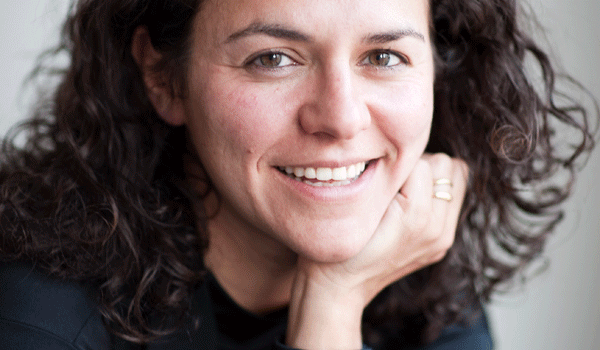Josephine Burton co-founded Dash Arts with Tim Supple in 2005. Since then, they have produced cross-art work in the UK, ranging from an Indian A Midsummer Night’s Dream to an Arabic Series of live events. Focusing on experiences of art as a prism through which to engage with and see the world, the company have tried to engage with contexts that are both topical and problematic, with an emphasis on work situated in the shape-shifting cultural climate of London. We spoke to Josephine about Dash Arts’ most recent venture – Dash Blaze, as part of their Soviet Series, its origins, scope and remit within the work of the producing house. From troubadours and a theatrical folk quartet through to an international theatre workshop aimed at performers from London’s migrant communities, Dash Blaze presents a cross-section of works in various forms, in the context of a precarious political conflict taking place in the region.
Run Riot: Can you tell us how you feel Dash Arts engages with work from such a wide range of cultures, and what lies behind the impetus to bring this to London?
Josephine Burton: Tim and I set up Dash Arts to create work with artists abroad – aspirationally to create work that helped us understand the world in which we lived better, and change the way we and our audiences see the world. The projects that we have made and almost made (!) over the years have been led by our own personal interests; what interests and excites us, and what do we want to learn more about?
So, as an example, in addition to the fact that the music and culture of the Arabic-speaking region has long fascinated us, we chose this region because we are interested in otherness. For many years, and particularly since 2001, the Arabic world has often been presented in the media as the West’s polar opposite. We wanted to challenge this notion of a homogenous other by travelling across the region, reading, watching, listening and talking with artists, and making a number of diverse works that would explode this notion of one oversimplified bloc. So over four years, we researched and made a number of works with artists from the Arab world and presented three shows in the UK – Babel, a dance work with Sidi Larbi Cherkaoui, Damien Jalet and Antony Gormley at Sadler’s Wells; Lyrical Alliance, a work exploring Arabic hiphop and classical Arabic poetry made with rappers drawn from across the region which premiered at Roundhouse; and One Thousand and One Nights, co-written by my colleague Tim and Hanan Al Shaykh and devised with actors from across North Africa, Middle East, the Gulf and Europe which had its UK premiere at the Edinburgh International Festival.
You mention a wide-range of cultures….it’s actually a slow-burning project for us. Each major project, Tim’s Indian Dream, the Arabic Series and the current Soviet Series end up taking years to develop, research and create. The joy of each Series is the journey – our understanding and focus clarifies as we slowly learn more – from seeing work in the region, creating deep relationships with artists and collaborators, reading, watching, trying to learn languages and slowly piecing together the various strands in each production. This takes time, along with raising the funds to make the work and the partners to show it. Along the way, we develop relationships with artists, audiences and communities in the UK – our diverse cultural landscape in London is quite an inspiration for the work too – through our Dash Cafes and other participation projects.
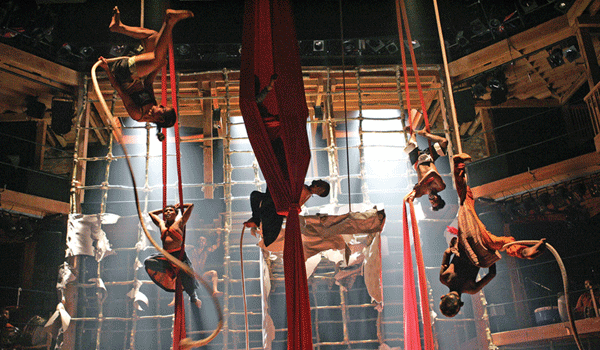
images: One Thousand and One Nights; Lyrical Alliance; Babel
RR: With particular reference to the Arabic Series, what role does context play in your producing work? Can you tell us a bit about how you approached programming the series and the discourses that come with bringing work from this particular region to the UK?
JB: Certainly the Arabic-speaking communities in the UK have grown exponentially over the last 15 years which meant that we were privileged to welcome many people who originated in the region as part of our audiences and as part of the conversations which helped develop the work and our understanding. And from a programming perspective for our [Dash] Cafes, I was blown away by the amount, diversity and quality of the musicians based in London who played with us.
“The Arab Spring” took place in the midst of our Series. There was certainly heightened interest in our work, and we hosted a number of conversations about Syria and Egypt with insightful artistic colleagues and journalists as part of our Cafes, which felt highly relevant and illuminating. However, these contemporary political events and upheavals also made it harder for us, too. One Thousand and One Nights rehearsals were scheduled to take place in Egypt in February 2011. Mubarak was removed at the end of January and the attention focused on Tahrir Square. At three weeks’ notice, we were forced to move our rehearsals and 40 strong cast / creative team to Fez which was a challenge and some cast members sadly left us along the way. And then disaster struck in June 2011, when 9 of the Syrian performers were refused visas to enter the US for our run in Chicago and we had to cancel the performances which continues to have financial repercussions on us today.
It’s probably worth adding that we do not deliberately court controversy and follow the conflicts! Although it might appear that way, given that our current focus of the region of the post soviet series is also riven with upheaval at the moment.
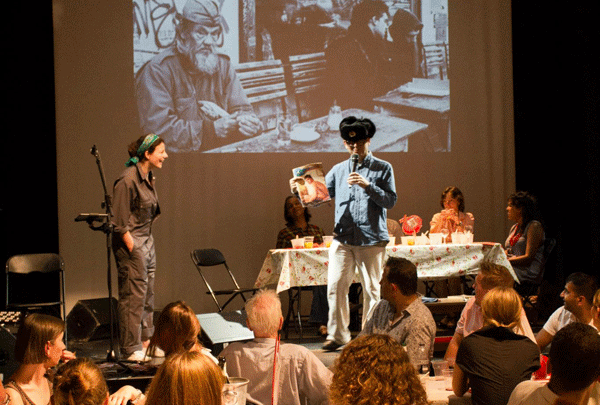
images: Dash Cafe
RR: Another strand of Dash Arts focuses on participation programmes, notably Faith to Faith in 2007, that brought together Christian, Hindu, Jewish, Muslim and Sikh teenagers on a photography project, and Lyrical Alliance in 2009, exploring Arab poetry through hip hop and spoken word. What informs these projects and how do you see this work in the wider framework of participatory, socially-engaged projects?
JB: Our participation work at Dash Arts does not have a specific agenda. We are often drawn to make UK-focused participation work that complements and deepens our engagement with the culture of the world in which we are focusing.
Faith to Faith – with young people across London faith schools – emerged from Conflicted, an exhibition of photography that I curated with Israeli and Palestinian artists in 2005. The Lyrical Alliance project that you refer to above, complemented our work with professional international rappers. We worked with young people in schools in the Borough of Westminster who developed new rhymes within schools and later at the Roundhouse and were inspired by the musicians rehearsing and performing in their nextdoor spaces. And finally in our current Soviet Series, we will create a new piece of theatre with London-based members of the communities from the Post Soviet State inspired by their own stories of migration from the region to the UK.
RR: In your own practice, you have worked with cross and inter-cultural projects, particularly in the context of music and performance. What attracts you to this type of work, and what do you look for in your programming? What are some of the problems that you encounter in producing in the context of a shifting discourse on internationalism, foreignness and the intercultural?
JB: I have always loved it – the sensation of listening to a piece of music, and not fully understanding its context, the complexity within all the lyrics, the world that produces the melody or its rhythm – and yet enjoying the sheer beauty and quality of the work. I like feeling out of my depth and pushing myself to learn more. I think that drives everything that I do.
I would do more of it if it wasn’t for the expense – international flights, visas, accommodation and the fact that introducing new artists to UK audiences means that you have no guarantee of strong box office income. This to me is the primary problem I encounter – alongside the growing red-tape of visas – I certainly do not feel that in London there is a reticence to embrace internationalism.
RR: Your upcoming series, Dash Blaze, brings together music and performance from “post-soviet states”, notably Ukraine, Russia, Armenia and Belarus. From Ukrainian Folk to a Trans-Siberian March Band, the series presents a range of practices through workshops, films, live music and events. Can you tell us about the different frameworks through which this work is being brought to London, and the core interests of the project?
JB: Blaze is an opportunity for us to bring together some of the amazing artists I have encountered during my research over the last few years. I am in the midst of making a project, the Post Soviet Orchestra, a new piece of music created with and for a newly assembled group of classically trained musicians drawn from across the region, and I have had the opportunity to meet and listen to some extraordinary performers along the way.
Radik Tyulyush for example I heard in Cardiff of all places last autumn at the music expo WOMEX. Radik is a multi-instrumentalist and throat singer from Tuva, Siberia, Russia. In performance, remote from his home, Radik closes his eyes and summons shamanically the animals and nature which surrounds and fills his world. it’s completely magical to see. He will perform with punk guitarist Lu Edmonds at the EBRD (European Bank of Regional Development) on 10th July. Dakha Brakha, I last saw in Kiev for tea at a cafe in March at their musical home, Dakh Theatre – a few stops on the metro from the chaos of the Maidan. They, like all Ukrainians, had been swept up in the upheavals of the last months and we discussed its impact on their work and growing audience. I spent an entrancing afternoon with them, listening to the songs of the Babuskhas who inspired their melodies and discussing the politics of folk music. I can’t wait to share that with UK audiences – thanks to WOMAD whom I talked into joining forces with us to bring them on top of their London gig and the British Ukrainian Society.
In London, we are collaborating with Rich Mix with whom we have built our Dash Cafes over the last 4 years. We’ll also present my London favourites the bonkers and brilliant Belarussian Sasha Ilukeyvich and his band of Highly Skilled Migrants, Armenian-born Paris based Lilith Guegamian thanks to a relationship with Music of Armenia and boarding the Trans Siberian Express with our partners Trans Siberian March Band.
And finally, we’re partnering with Latitude Festival to create a performance / installation space of a Russian country house- a Dacha – across the 20th century, complete with films, dressing up, games, live music, djs and impromptu participative play readings; hot tea from the Samovar and fevered political discussion with guests.
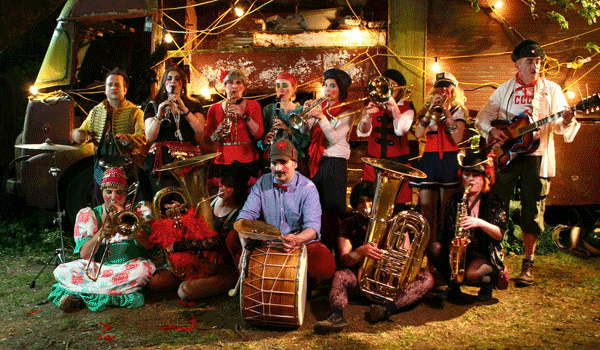
images: Trans Siberian Marching Band; Sasha Ilukeyvich and his band of Highly Skilled Migrants; Dakha Brakha; Lilith Guegamian; Radik Tyulush
RR: You deploy a particular terminology – post-soviet- to refer to the range of works presented in Dash Blaze, be it Armenian musician Lilith Guegamian or a Dacha, an immersive experience set in rural Russia at Latitude this year. Can you talk a bit more about that term specifically? What does it carry for you, what informed the choice of countries and artists and what was the research process that led to these decisions?
JB: A good question – we’ve spent many hours discussing the terminology over the last few years – as it is fraught with politics. The Soviet Union has a powerful, painful and ongoing legacy.
We are making new work that explores how it was to live under the Soviet Union and how it is to live today in its shadows. We decided to work with artists from a fixed geographic space – Belarus, Moldova, Ukraine, Russia, the Caucasus and Central Asia. Post-soviet is a reality for all of the countries that we are working in – even if it is not entirely visible. And the point of our work is to understand and unpack the different responses and relationships to the term, its history and its legacy.
RR: For Dash novices, what are your highlights?
JB: All the events, of course!
Dash Blaze
2-30 July 2014
at Rich Mix, Toynbee Studios, EBRD, Latitude Festival, WOMAD
dasharts.org.uk
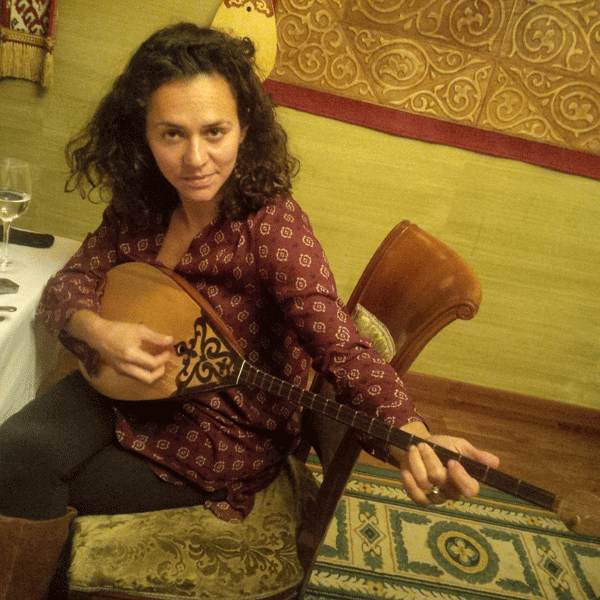
image: Josephine Burton playing the dombra in Almaty, Kazakhstan
